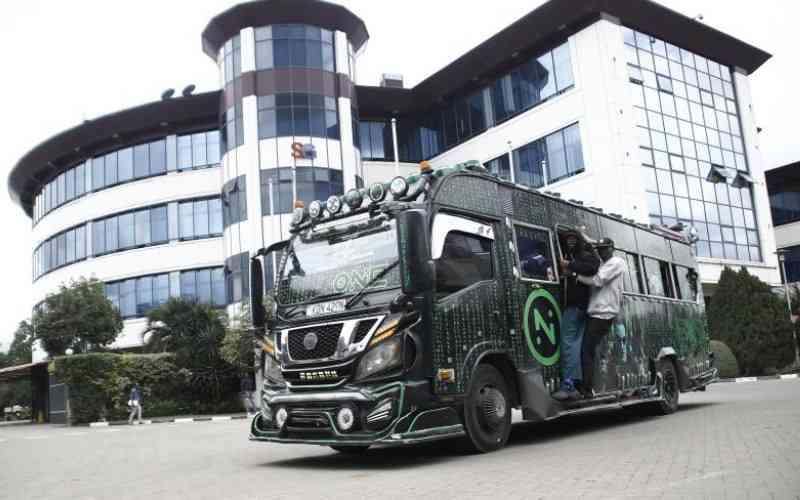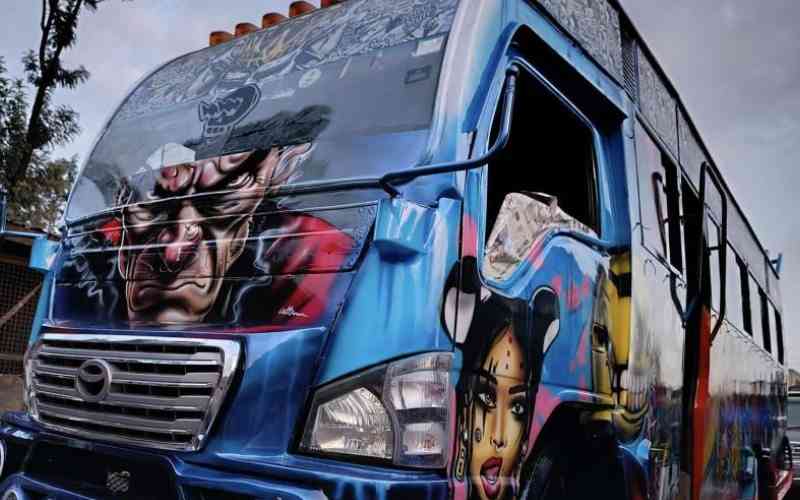
This week, a South African decided to stir the hornets' nest and he quickly found out. His honest mistake was boasting that his country has the best taxi (read matatu) in Africa.
What followed was what Kenyans of X are best known for. Coming together to defend the motherland, and that they did with splendour.
In less than two hours his quote replies was filled with Kenyans brandishing the Matwana or Nganya culture, with photos of the coolest matatus.
Many Hollywood celebrities have put it on their wishlist that they must ride a matatu once they set foot in 254.
But how do ‘nganyas’ come to be?
Before they are released onto the streets, there is so much that goes into making the matatu into what we see on the road.
From the dealership, to the fabricators, to graphic designers and airbrush artists, sound, light and screen installers to the crew who will operate the matatu, its all about the fine details.
“When we started Matwana Culture it was not just about fun but also about sustaining a culture through provision of employment opportunities to fellow Nairobi youth. We rebrand matatus and build value through the services we offer. From Hiring, management of individual or fleets to training people on art and sound, we have evolved as an organisation,” says Brian Wanyama also known as Graff, the founder of Matwana Culture.
Graff says the vibrant Nairobi culture is often reflected through the artwork displayed by matatus, which in turn influences the lifestyle of young people. From hiphop, football, basketball and everything uptown, their depiction echoes the trope of urbaneness.
“As a culture, it is not just about using the matatus as a mode of a transport but it has evolved into other elements. For example the Matwana Party Cruiser is a concept that is about club hopping in the city while having fun through the night. We also offer day time around the city for tourists who want to experience the matatu culture,” says Graff.
In their element, they are flashy, unapologetically loud and most of the time fast, with traffic rules given a wide berth when it comes to their regulations.
At times, the government through a number of its agent tries to reign in the erratic and rowdy ones and those who put their best behaviour have seen them receive a pat in the back.
Afrika Mashariki Transport Awards
One of the recent initiatives that brings stakeholders of the industry is the Afrika Mashariki Transport Awards (AMTA). This is a pioneering initiative in Kenya and East Africa, seeking to recognize and celebrate outstanding achievements in the transport industry.
As the first event of its kind, it aims to acknowledge and honor the remarkable contributions made by individuals and organizations in advancing transportation practices within the region.
Transport sector stakeholders and partners of the award will get a chance to showcase innovations in the industry.

“The awards seek to celebrate excellence and talent in the industry. It is also a platform for networking and raising awareness about road safety.” Afrika Mashariki Transport Awards (AMTA) founder Edgar Meshak.
The awards, now on the fourth year, bring together stakeholders in the transport sector including NTSA, Safaricom, Standard Group PLC, Ministry of Transport, Kenya Railways, Kenya Ports Authority and the Kenya Civil Aviation Authority.
“Having the awards is a step in the right direction because the organisers have been consistent with it and it brings the whole industry together. By bringing the corporate world into the mix is a nod of confidence by players in other industry to what we are pushing,” says Graff. Standard Group PLC Chief Executive Officer Marion Gathoga welcomed the partnership. She said the company’s online motor show platform, Digger Motors, was in support of AMTA’s vision of recognising excellence in the transport sector.
“At the Standard Group PLC, we are immensely proud of our more than 100-year heritage. We are delighted to be associated with the AMTA awards, which celebrate excellence in the transport industry,” Gathoga said.
“As a leader in the transport and automotive space, the Standard Group PLC consistently hosts major thought leadership forums, bringing together key stakeholders from the private sector, government, and academia to discuss critical transport matters and their impact on society. We also spotlight all happening of the sector on our 360-degree media platforms,” the CEO says.
The awards will be enhanced by a three-day Transport Expo. This exhibition is designed to gather industry leaders and experts to share insights on new trends and solutions in transportation.
Taking place at the Sarit Expo Centre, the expo is projected to attract approximately 10,000 attendees.
While the event will be taking place, Road safety and adherence of traffic rules remains a key emphasis with the National Transport and Safety Authority (NTSA) Deputy Director, Duncan Kibogong, pointing out that road safety was a collective role of all and not just that of the government. He cautioned road users against reckless road habits and asked motorists to be mindful of fellow road users as he cautioned the rate of road fatalities was rising at an alarming rate.
“Indeed the transport industry is an important pillar in the economy, offering services to commuters, delivering farm produce and manufactured products among others. NTSA will continue to support the industry by playing the crucial role in enhancing road safety and service delivery through strategic innovation management and technology,” he said during the launch of this years’ award held at Standard Group offices.
AMTA co-founder Warren Lamu says that with the rise in urbanisation and technological advancements, innovation in transport is necessary to meet an ever growing demand, in a world that is also more conscious of environmental protection
“The event will thus examine the current state of transportation in East Africa and forecast the future trends and challenges that are likely to impact the industry, and therefore the adjustments to consider. The impact of emerging technologies, such as electric vehicles, autonomous vehicles, and ride-sharing platforms, and their potential in revolutionising transportation in the region, will be a key focus,” he adds.
“I have been in the matatu industry as a fan also a stakeholder. I love everything sound and although I didn’t study sound installation, working in Nairobi at Ngara under different people gave me the experience and insight.
“Now I do it for matatus in Mombasa. The scene here is hugely influenced by what was started in Nairobi, but we also have our own unique designs and now it is an industry that employs a lot of young people here,” says Karim Omar, a sound installer from Mombasa.
Stakeholders present during the launch include Watu Gari, VW Babes, Advanced Road Users Safety Institute, Sikika Road Safety, Tembea Tujenge Kenya, She Can Drive Kenya and Forester Nation.
The awards General Category features Motorclub of the Year, Auto Dealer of the Year, Auto Bazaar of the Year, Fuel Station of the Year, Best Breakdown Recovery and Towing Service and Driving School of the Year.
There is also Transport Infrastructure Category with Rail Infrastructure of the Year, Aviation Transport Infrastructure of the Year as well as Bikers Category featuring Riding Club of the Year and Bikers Safety Initiative of the year.
Other categories include Awards Nominated by Judges, Outstanding Personnel of the Year, Transport Sector, Recognition and Celebration, Matatu Awards and Media in Transport.